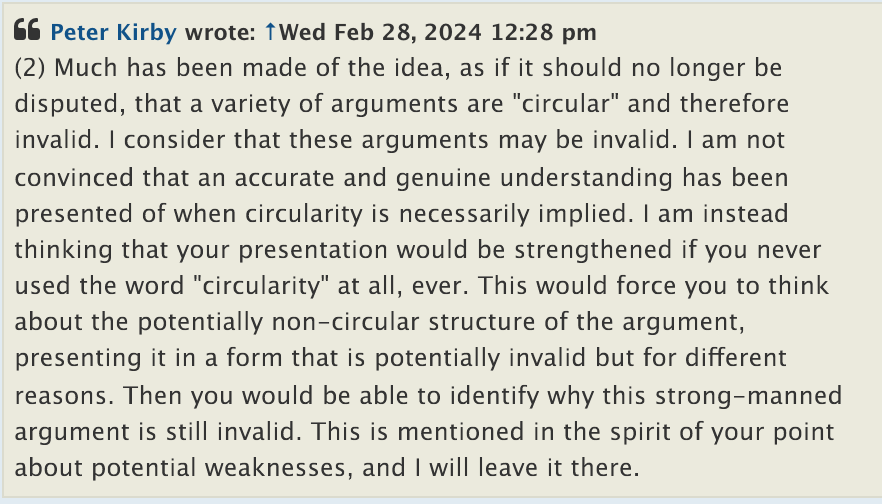So let’s resume my specific responses to criticisms raised on the earlywritings forum over the question of the Hellenistic era being the earliest setting for the Pentateuch and other books of the Bible. (I am posting my responses here after discovering that on that forum some of my responses were being removed without notice or explanation.)
I have now come to the moment when the moderator (Peter Kirby) of what was designated an Academic Discussion part of the forum entered. His initial post was lengthy and it took me quite a number of readings before I thought I understood the main points clearly enough before responding. But I’ll focus here on what was clear.


From that remark I assumed that the commenter must have known the arguments I was referring to and disagreed with the claim that they were circular. But in the course of the discussion I learned that he did not know what those arguments were and simply assumed I must have been falsely claiming they were circular. The fact that I had alluded to the critique of circularity itself came from scholarly criticisms was no doubt inadvertently overlooked.
I found myself in a confusing situation. Here I was being asked to reword arguments (that I later learned were unknown to the commenter) in such a way that they were no longer logically invalid.
In effect, the daunting challenge that I was being confronted with was this:
Take the following argument:
- The biblical narrative of King Josiah strongly indicates that Deuteronomy made its first appearance in the time of King Josiah
- We conclude this from the fact that the story of Josiah appears to have been written to prove to readers that King Josiah learned of the laws in Deuteronomy and proceeded to act on them. Many passages in the Book of Kings reflect Deuteronomistic language so it looks like Deuteronomy was a key text motivating the author of the story of King Josiah.
- Therefore we conclude that the author of the narrative had historical sources about these events and used them to create his narrative
- The narrative is therefore based on historical events that came to be known to the author although we concede that the author put his own spin on the events.
Now I was given a monumental challenge. I was being asked to accept that the above line of “logic” was not credible (to this much I agree!) — that I was being asked to grant that biblical scholarship would not be so crudely fallacious (to that I cannot agree, having seen so many, many instances of biblical scholarship arguments based on fallacies and ignorance) — and that I was being asked instead to find a way to re-present the arguments for Deuteronomy being known to Josiah in a way that was not circular.
If only I could inform readers of the arguments in a way that did not make them look fallacious!
Now I fully agree with the principle that one should always construct one’s opponents’ arguments in as strong a manner as possible before attempting to address them, but how does one rearrange a circle into a straight line and still claim one is addressing the original point?
And what should I make of countless scholarly volumes that at some point zero in on critiquing a logical fallacy (most commonly circularity) of arguments being bandied about in the field?
My dilemma was that I had read and analysed the arguments of the Documentary Hypothesis (or let’s keep it simple and limit it to the discussion of Josiah and the Book of Deuteronomy), AND I had read the observations of scholarly critics of those arguments, and now was being asked to create new arguments for Deuteronomy being known in the time of Josiah that were not circular.
I felt like I was being asked to perform a magic trick even though I knew I was not a magician. If the only arguments that have been presented in the literature are indeed circular, how could I re-word them so they would not be circular?
If such a challenge was coming from one of the well-known trolls on the site I would have brushed it aside. But the moderator had some kind of reputation for being reasonably knowledgeable and intelligent — and he even said he wanted me to take his criticism in the presumably well intentioned spirit in which it was offered.
I do have to give him credit, though. He really was kindly condescending enough to try to help me out and to get me to “be reasonable” and join his world in the land of Gulliver’s Laputans.
It took a little more discussion — one that devolved into where I found myself fending off a barrage of presumptuous psycho-analysis in which he attempted to persuade me to acknowledge my “hidden psychological identity needs” that were propelling me to make the arguments in the way I was — before it finally dawned on me that I had misguidedly been knocking on the gates of Laputa.
Thus it has ever been the way, has it not? Guardians will always be there to fiercely defend the defined limits of allowable discussion and criticism. And the weapon they will always pull out is the pop-psychological analysis, otherwise known more politely and generically as “ad hominem”.
If you enjoyed this post, please consider donating to Vridar. Thanks!

It is sad, but true . . . in the hard sciences, also.
All the circular arguments seem to keep circling back to preconceived assumptions which almost always cloud one’s judgement.
As far as Josiah and Deuteronomy. Amazing how Deuteronomy could exist when the Pentateuch hadn’t even been written yet. “Found in the Temple”??? Yeah, right, after years of “reconstruction”. That’s an old Egyptian trick. They didn’t even bother to quote a single line from this “Torah Scroll”. Lot’s of “red-flags”. Where was Jeremiah the Prophet?
The long lost book or treasure etc found by chance or supernatural direction is a common enough motif in fiction, as we know. For more on “where was Jeremiah when we expected him” we have a comprehensive discussion by Russell Gmirkin: https://www.academia.edu/82084563/The_Manasseh_and_Josiah_Redactions_of_2_Kings_21_25
First, is it possible that Mr. Kirby believes that referring to anything as “circular argument” is some kind of ad hominem attack on the person making said argument? I don’t the guy, but the message you quote feels like an attempt to coach you on how to play nicely with others , which is something you would expect a moderator to do.
Second, and this is something of an aside, but have you spent any time reading Calum Carmichael’s work? In several of his books, he asserts that the narratives of the Primary History were written to illustrate the laws of the Primary History, e.g., Deuteronomy. It’s an interesting hypothesis, and I think it works pretty well. For example, applying his prism to 1 Kings, it is clear that Solomon failed to follow the edicts of Deuteronomy 17:14-20, and the story of Josiah’s discovery of Deuteronomy underscores specifically Solomon’s failure to follow Deuteronomy 17:18-20. It was Solomon’s “original sin” that caused Yahweh to cast out the Israelites. David did not fare much better, which is why I view the stories of David and Solomon as polemical, not laudatory, of the house of David.
Where I disagree with Carmichael is that the narratives and laws could have been spun from whole cloth, i.e., there is no basis for his assumption that there were any then-existing narratives of the laws of “Ancient Israel” at the time the Primary History was constructed.
Yes, I think I read most of CC’s works but that was some time ago. I keep them on hand because I am sure to want to recheck some of his arguments again in the light of what I have been reading since. Right now my focus is still on trying to get a handle on the culture of the Hellenistic era, especially in the “Near East” region, and exploring how the biblical works are best explained in the light of Samarian and Judean events from Persian through to Hellenistic times.
As for Kirby, …. No, that was not his explanation for why he did not want me to refer to circularity. I even pointed out in my response that identifying circularity in scholarly literature was standard process — pointing him to over 200 scholarly works that address that very problem. He did not refute my links or quotations explaining that identifying circularity in scholarly discourse was expected and widely practised. Instead, he dug into psychoanalyzing my motives for presenting the arguments “in the way I did” — and the circularity point was only one of a raft of arguments. I could link to the very long posts of his to verify my point if interested. In the past even when I have called for calm and civility of discourse in defence of others whom I have considered were treated maliciously he has for some reason chosen to see my comment as critical of his moderation and deleted those posts. I finally have been forced to conclude he has a jaundiced view of me that I do not understand — he has directly told me he believes my attitude and motives are hostile and that I must be kidding myself if I can’t admit that – so it is clear that my presence on his forum will always give us both grief as long as he is moderator. (This was not the reason I exited the forum — my reason for that was when I discovered that the moderator simply removed comments of mine without notice or explanation leaving me unable to refer back to previous points in a discussion that I thought had been covered.)
If you’re interested in getting a handle on the culture of the Hellenistic Era, one book I would suggest is [i]The Syrian Wars[/i] by John D. Grainger, which theorizes that there was an inter-generational treaty between the Ptolemaic and Seleucid kingdoms that put Coele-Syria (aka the Levant) up for grabs whenever one or the other head of state died. Ptolemy Ceraunus triggered the first Syrian War by killing Seleucus I Soter while traveling together to Macedonia (why were they traveling together, I wonder), creating problems for Ptolemy II.
And if you read other traditional histories of the two kingdoms, it is impossible to imagine that either were “Hellenizers.” Ptolemy did his best to “Egyptize” hellenes who settled in the Fayum, and he did so by hellenizing an Egyptian god (Serapis).
Thank you for the notice. I see it is even available for free legally at https://archive.org/details/JohnD.GraingerTheSyrianWars./mode/2up
Another I have on my list to consult is:
Very much regret to say it but Peter Kirby also has a history of unsavoury personal attacks on Russell Gmirkin and select others (and refusal to rein in trolls even when they come out with some particularly vile insults)— and my own attempts to defend others against abuse has unfortunately led to myself becoming the target.